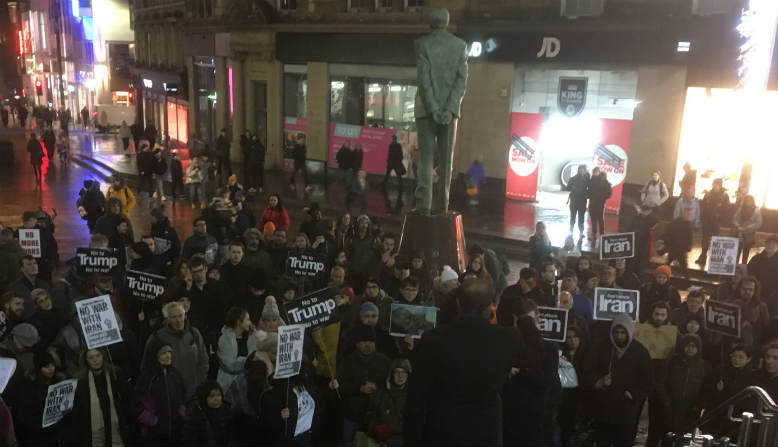 Gathering at the anti-war protest in Glasgow
Gathering at the anti-war protest in Glasgow
Over 200 people gathered at Buchanan Steps on Monday 6th January to say no to US imperialism, reports Vladimir Unkovski-Korica
Chanting and waving placards against war, Glaswegians joined a wave of global protest against a potential war on Iran on Monday evening.
The protest was called by Glasgow Stop the War Coalition at short notice, following the extrajudicial assassination of Iranian general Qasem Soleimani on Iraqi soil.
Hours before the protest, it emerged that Soleimani was in Iraq to negotiate a lessening of tensions in the country and the region between Iran and Saudi Arabia.
People I spoke to on the protest were bewildered by what Donald Trump was trying to achieve with Soleimani’s assassination and the ratcheting up of inflammatory rhetoric since Friday.
Some speculated that it was an erratic move by an angry President. They pointed out that Trump benefits from wide-ranging foreign-policy freedoms granted to previous Presidents by Congress. These allow the executive branch free reign abroad without much domestic accountability.
Trump’s rage that he was unable to bring Iran to heel following his withdrawal of the US from the Iran nuclear deal commitment last year was compounded when Iranian-backed militias sieged the US embassy in Iraq in recent days.
The United States has seemingly lost control of the Middle East, following the Iraq invasion in 2003, and now seems to follow the lead of regional allies like Saudi Arabia, Israel, and Turkey, as well as more hawkish elements in its own administration, to which Trump bowed on yet another occasion.
Others pointed to Trump’s domestic woes instead. He faces a re-election battle later this year, following an embarrassing impeachment process in which the US House of Representatives voted that he stand trial in the Senate.
Trump stands accused of pressuring US ally Ukraine to pass detrimental information on potential Democratic contender for President Joe Biden and his son and then obstructing an inquiry into the matter by Congress.
There is nothing like a ratcheting up of tensions in the Middle East, and a potential war, to unite the American ruling class and the evangelical right. So Trump might have been motivated by his electoral interests in 2020.
Whatever the truth, there was general agreement among protesters that the moment was a dangerous one. Trump’s threats to destroy Iranian cultural sites can only inflame feeling the Middle East and make Iranian retaliation more likely, heightening the potential for a further cycle of violence and chaos.
Speakers from Buchanan Steps demanded unequivocal UK condemnation of US actions in recent days. Labour MSP Pauline McNeill called for a separation of the UK position from the American position.
Radical Independence Campaign activist Jonathon Shafi said the next decade was certain to see more wars and revolutions and called on all present to make sure the revolutions to make peace win out over the warmongers.
Other speakers, Iranian and American, reinforced the message that peace is in the interests of the region and the world. A Scottish and Iranian flag were held up behind the speakers to show solidarity with the people of Iran, who would be the principal victims of any US-led assault on the country.
The crowd chanted ‘No justice, no peace, US out of the Middle East!’ and some placards called for more money to be spent on welfare rather than warfare.
The anti-war movement in Scotland has again shown it is ready to stand up to US and UK imperialism. We will likely have to be ready to do more, as will movements across the US and UK, in the coming weeks. The situation remains volatile.
It is important to take this message back into workplaces, colleges, and communities. Stopping Trump would mean stopping a massacre, but also the strengthening of movements that can take own our own government on issues related to war and peace, but also domestic priorities.

